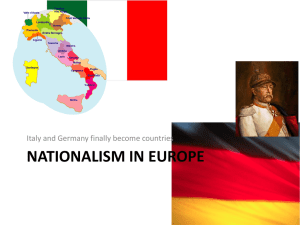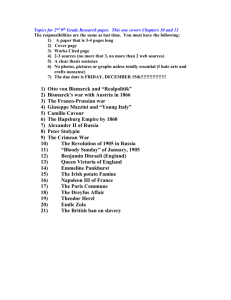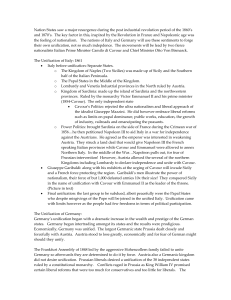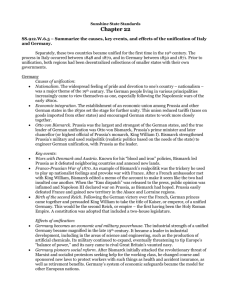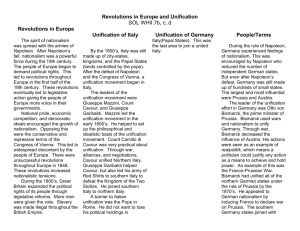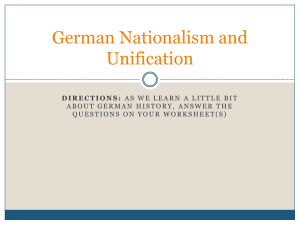Page 1 1. By about 1875, liberal issues and proposals which had
advertisement
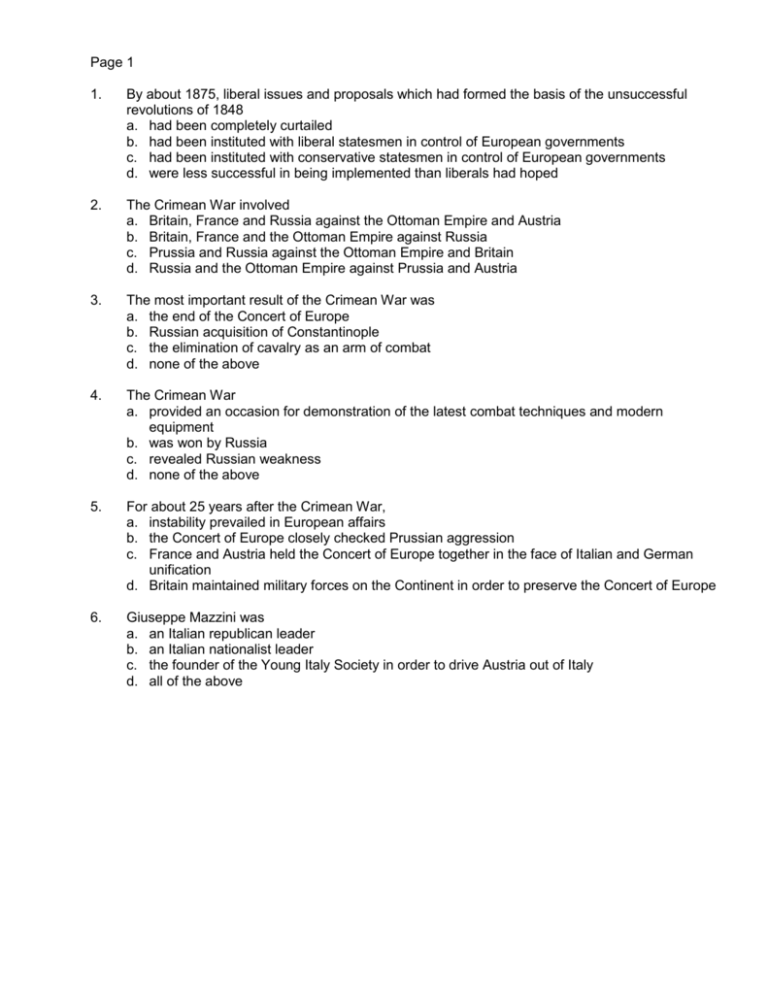
Page 1 1. By about 1875, liberal issues and proposals which had formed the basis of the unsuccessful revolutions of 1848 a. had been completely curtailed b. had been instituted with liberal statesmen in control of European governments c. had been instituted with conservative statesmen in control of European governments d. were less successful in being implemented than liberals had hoped 2. The Crimean War involved a. Britain, France and Russia against the Ottoman Empire and Austria b. Britain, France and the Ottoman Empire against Russia c. Prussia and Russia against the Ottoman Empire and Britain d. Russia and the Ottoman Empire against Prussia and Austria 3. The most important result of the Crimean War was a. the end of the Concert of Europe b. Russian acquisition of Constantinople c. the elimination of cavalry as an arm of combat d. none of the above 4. The Crimean War a. provided an occasion for demonstration of the latest combat techniques and modern equipment b. was won by Russia c. revealed Russian weakness d. none of the above 5. For about 25 years after the Crimean War, a. instability prevailed in European affairs b. the Concert of Europe closely checked Prussian aggression c. France and Austria held the Concert of Europe together in the face of Italian and German unification d. Britain maintained military forces on the Continent in order to preserve the Concert of Europe 6. Giuseppe Mazzini was a. an Italian republican leader b. an Italian nationalist leader c. the founder of the Young Italy Society in order to drive Austria out of Italy d. all of the above Page 2 7. Camillo Cavour believed a. in nationalism and republicanism b. that if Italians proved themselves to be efficient and economically progressive, the great powers might allow self-rule c. that Italy had to be united by "blood and iron" d. all of the above 8. Cavour thought that Piedmont should enter the Crimean War because a. Europeans would then consider Piedmont a military power b. he supported the Concert of Europe c. he sought to gain territory in the grain-rich Black Sea region d. he wanted a close relationship with France 9. In 1858, Cavour allied with France in order to a. enter the Crimean War as a united front b. provoke war in Italy which would permit their nations to intervene against Austria c. eliminate radical republicans from Italy d. both b and c 10. Cavour's method of unification was that of a. divide and conquer b. force of arms c. secret diplomacy d. both b and c 11. In obtaining Italian unification, Cavour a. worked closely with Mazzini b. was compelled to pursue the complete unification of northern and southern Italy by Garibaldi c. forced Garibaldi to give up the notion of a republican Italy d. both b and c 12. The king of the new Italian state in 1861 was a. Benedetto Croce b. Giuseppe Mazzini c. Victor Emmanuel d. no one since it was proclaimed a republic 13. The process of Transformismo a. took place after Cavour's death b. meant the transformation of political opponents into governmental supporters through bribery and favors c. referred to the transformation of Italy into an industrial state d. both a and b Page 3 14. The single most important political development in Europe between 1848 and 1914 was a. the unification of Italy b. the unification of Germany c. the establishment of the Paris Commune d. the Dreyfus affair 15. Otto von Bismarck was a. a political pragmatist who put more trust in power and action than in ideas b. born of Junker stock c. at first a political reactionary d. all of the above 16. Who said, "The great questions of the day will not be decided by speeches and majority decision, but by iron and blood"? a. Cavour b. Garibaldi c. Kaiser William I d. none of the above 17. What major political problems did William I have before he recruited Bismarck? a. creating a spirit of patriotism in Prussia b. controlling the Prussian Parliament which wouldn't approve taxes necessary for military expansion c. finding a competent general d. being accepted as king after the deposition of his brother, Frederick William IV 18. Germany was united a. by conservative forces in the state b. by liberal forces in the state led by Bismarck c. because of continuous Austrian support d. both b and c 19. Bismarck opposed a. a republic for Germany b. parliamentary government c. the constitutionalism that provided a strong monarch d. the Junkers 20. The Danish War of 1864 was begun over a. the annexation and administration of Schleswig and Holstein b. Austrian desire to control Denmark c. Danish abuse of its German population d. both a and b Page 4 21. The Kleindeutsch or "small German" policy of Bismarck a. ultimately excluded Austria from German affairs b. was designed to unite Germany gradually in small additions c. was realized in the Austro-Prussian War of 1866 d. both a and c 22. The Prussian defeat of Austria in 1866 a. permanently excluded the Habsburgs from German affairs b. resulted in a harsh treaty in which Austria lost a great amount of territory to Prussia c. left Hanover the only major competitor for leadership among the German states d. prolonged the Schleswig-Holstein problem 23. The Reichstag was a. the hunting lodge where Bismarck and Napoleon III divided up the states of the North German Confederation b. federal council c. lower house of the Bundesrat d. supreme court of the North German Confederation 24. Bismarck crushed the Prussian liberals by a. forming a split between those who prized liberalism and those who supported unification b. undercutting their support among the people c. making the monarchy and the army the most popular institutions in the country d. both a and c 25. The Ems telegram was a. edited by Bismarck to appear to insult the emperor of Austria b. designed to goad France into war with Prussia c. unsuccessful in bringing about a dispute between Prussia and Austria d. both a and c 26. The Battle of Sedan in 1870 resulted in a. the death of Napoleon III b. the failure of Bismarck's ideals for German unification c. the humiliation of France d. the loss of the northern half of France to Germany 27. Napoleon III became more liberal after 1860 because a. riots broke out again in Paris b. his foreign policy was unsuccessful c. the French bureaucracy had gradually become more liberal d. he had major financial problems Page 5 28. Initially, most of Napoleon III's support came from the a. nobility b. French Catholic Church c. urban artisans d. both a and b 29. The Paris Commune was a a. socialist experiment in communal living b. reaction to the National Assembly of the New French Republic c. successful municipal division of the Third French Republic d. none of the above 30. The short-term goal of the Paris Commune was to a. make an accommodation with the National Assembly b. disarm the National Guard and reestablish a citizen militia c. administer the city differently from the rest of the country d. both a and b 31. Adolphe Thiers was the a. leader of the Paris Commune b. leader of the French state in the negotiation of the settlement with Prussia following the elimination of Napoleon III c. minister who was the architect of French foreign policy throughout the next 25 years d. all of the above 32. The long-term goal of the Paris Commune was the a. creation of a workers' republic b. creation of a nation of relatively independent, radically democratic enclaves c. destruction of the National Assembly d. institution of a Marxist state 33. The suppression of the Paris Commune represented the a. destruction of a genuine proletarian revolution by the French bourgeoisie b. protection of private property c. triumph of a centralized nation-state over an alternative form of political organization d. both b and c 34. The Bourbon Duke of Chambord refused to become king of France in the early 1870's because a. he feared another revolution b. conservative monarchists would not return to the white flag of the Bourbons c. he had no son d. both a and c Page 6 35. The Third Republic proved to be a strong political entity since it a. overcame two major scandals involving bribery b. overcame a major coup d'etat supported by General Boulanger c. fought back a repeated attempt at control of the country by the Paris Commune d. both a and b 36. Captain Dreyfus was convicted for a. being Jewish b. improperly executing a French soldier c. passing secret documents to the Germans d. none of the above 37. The Dreyfus case resulted in a. pro-Semitic legislation b. anti-Semitic legislation c. an informal alliance within the political left d. both a and c 38. A newspaper article entitled "J'accuse" in support of Dreyfus was written by a. Adolphe Thiers b. Marshal MacMahon c. Emile Zola d. Jacques Proudhon 39. The February Patent of 1861 a. established a Reichsrat, or bicameral parliament within the Austro-Hungarian Empire b. was rejected by the Magyar nobility c. governed the Austro-Hungarian Empire for six years d. all of the above 40. The concept of a triple monarchy favored by the Czechs failed because a. Francis Joseph refused to lose more of his powers b. the Magyars vetoed the proposal c. the Austro-Prussian War interrupted negotiations d. none of the above 41. The Compromise of 1867 transformed the Hapsburg Empire into a. a dual monarchy b. a republic c. four administrative units d. a dependency of Italy Page 7 42. Alexander II of Russia a. abolished serfdom b. was a liberal reformer c. raised the period of recruitment in the army to 25 years d. all of the above 43. Populism in Russia was a a. movement to improve crop yields b. movement to abolish serfdom c. student movement which sought social revolution based on the communal life of the Russian peasants d. none of the above 44. Populism was a. an agricultural movement for the improvement of harvests through the most modern technology b. a social revolutionary movement based on the ideas of Alexander Herzen c. a political movement which sought the overthrow of tsarist autocracy d. a radical society based on the successful Land and Freedom model 45. The "Irish question" involved a. the suppression of Roman Catholicism b. more Irish control of local government c. the ownership and management of Irish land by British landlords d. both b and c 46. Why was it so difficult to unify Italy? What groups were urging unification? Who was Cavour and how did he achieve what others had failed to do? What was Garibaldi's contribution to Italian unification? 47. Who was Bismarck and why did he try to unify Germany? What attempts had preceded Bismarck and why did they fail? What was Bismarck's policy of unification and why did he succeed? What effect did the unification of Germany have on the rest of Europe? 48. Italy and Germany were unified under the close supervision of individual statesmen. What were the general strategies of Cavour and Bismarck in the unification process? Which country had more potential for European leadership after unification and why? 49. What factors might explain the triumph of liberalism and nationalism after the collapse of the 1848 revolutions? Include at least three countries in your discussion. Page 8 50. Describe the government changes in France and Austria after 1848. What unique problems did Austria have? Were they solved? Why did Russia not undergo similar reforms? In about 1875, what major problems did Europe face? 51. How would you contrast the British Liberal and Conservative parties between 1860 and 1890? Who were the leaders of each? What problems did they face in those years and what different solutions did they favor? 52. Discuss the transformation in France from the Second Empire of Napoleon III to the establishment of the Third Republic. Why did the Paris Commune become a legend throughout Europe? How did the Dreyfus affair affect the success of the Third Republic? 53. What was the "Irish Question" and how was it handled by the Gladstone administration? How did it affect British politics in the early 20th century? Page 1 1. 2. 3. 4. 5. 6. 7. 8. 9. 10. 11. 12. 13. 14. 15. 16. 17. 18. 19. 20. 21. 22. 23. 24. 25. 26. 27. 28. 29. 30. 31. 32. 33. 34. 35. 36. 37. 38. 39. 40. 41. 42. 43. 44. 45. 46. 47. 48. 49. 50. 51. c b a c a d b a b d d c d c d d b a b a d a c d b c b b b c b b d b a c c c d b a a c b d No answer in TestBank No answer in TestBank No answer in TestBank No answer in TestBank No answer in TestBank No answer in TestBank

